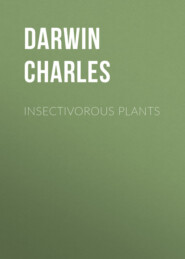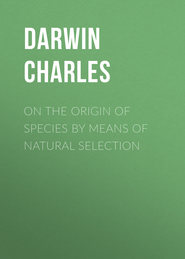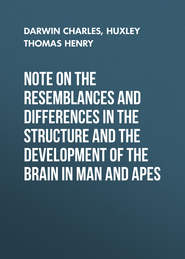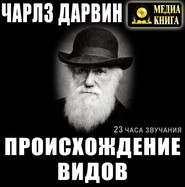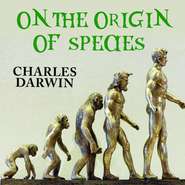По всем вопросам обращайтесь на: info@litportal.ru
(©) 2003-2024.
✖
Charles Darwin: His Life Told in an Autobiographical Chapter, and in a Selected Series of His Published Letters
Настройки чтения
Размер шрифта
Высота строк
Поля
The last revise of the Descent of Man was corrected on January 15th, 1871, so that the book occupied him for about three years. He wrote to Sir J. Hooker: "I finished the last proofs of my book a few days ago; the work half-killed me, and I have not the most remote idea whether the book is worth publishing."
He also wrote to Dr. Gray: —
"I have finished my book on the Descent of Man, &c., and its publication is delayed only by the Index: when published, I will send you a copy, but I do not know that you will care about it. Parts, as on the moral sense, will, I dare say, aggravate you, and if I hear from you, I shall probably receive a few stabs from your polished stiletto of a pen."
The book was published on February 24, 1871. 2500 copies were printed at first, and 6000 more before the end of the year. My father notes that he received for this edition £1470.
Nothing can give a better idea (in a small compass) of the growth of Evolutionism, and its position at this time, than a quotation from Mr. Huxley[242 - Contemporary Review, 1871.]: —
"The gradual lapse of time has now separated us by more than a decade from the date of the publication of the Origin of Species; and whatever may be thought or said about Mr. Darwin's doctrines, or the manner in which he has propounded them, this much is certain, that in a dozen years the Origin of Species has worked as complete a revolution in Biological Science as the Principia did in Astronomy;" and it had done so, "because in the words of Helmholtz, it contains 'an essentially new creative thought.' And, as time has slipped by, a happy change has come over Mr. Darwin's critics. The mixture of ignorance and insolence which at first characterised a large proportion of the attacks with which he was assailed, is no longer the sad distinction of anti-Darwinian criticism."
A passage in the Introduction to the Descent of Man shows that the author recognised clearly this improvement in the position of Evolutionism. "When a naturalist like Carl Vogt ventures to say in his address, as President of the National Institution of Geneva (1869), 'personne, en Europe au moins, n'ose plus soutenir la création indépendante et de toutes pièces, des espèces,' it is manifest that at least a large number of naturalists must admit that species are the modified descendants of other species; and this especially holds good with the younger and rising naturalists… Of the older and honoured chiefs in natural science, many, unfortunately, are still opposed to Evolution in every form."
In Mr. James Hague's pleasantly written article, "A Reminiscence of Mr. Darwin" (Harper's Magazine, October 1884), he describes a visit to my father "early in 1871," shortly after the publication of the Descent of Man. Mr. Hague represents my father as "much impressed by the general assent with which his views had been received," and as remarking that "everybody is talking about it without being shocked."
Later in the year the reception of the book is described in different language in the Edinburgh Review: "On every side it is raising a storm of mingled wrath, wonder and admiration."
Haeckel seems to have been one of the first to write to my father about the Descent of Man. I quote from Darwin's reply: —
"I must send you a few words to thank you for your interesting, and I may truly say, charming letter. I am delighted that you approve of my book, as far as you have read it. I felt very great difficulty and doubt how often I ought to allude to what you have published; strictly speaking every idea, although occurring independently to me, if published by you previously ought to have appeared as if taken from your works, but this would have made my book very dull reading; and I hoped that a full acknowledgment at the beginning would suffice.[243 - In the introduction to the Descent of Man the author wrote: – "This last naturalist [Haeckel] … has recently … published his Natürliche Schöpfungs-Geschichte, in which he fully discusses the genealogy of man. If this work had appeared before my essay had been written, I should probably never have completed it. Almost all the conclusions at which I have arrived, I find confirmed by this naturalist, whose knowledge on many points is much fuller than mine."] I cannot tell you how glad I am to find that I have expressed my high admiration of your labours with sufficient clearness; I am sure that I have not expressed it too strongly."
In March he wrote to Professor Ray Lankester: —
"I think you will be glad to hear, as a proof of the increasing liberality of England, that my book has sold wonderfully … and as yet no abuse (though some, no doubt, will come, strong enough), and only contempt even in the poor old Athenæum."
About the same time he wrote to Mr. Murray: —
"Many thanks for the Nonconformist [March 8, 1871]. I like to see all that is written, and it is of some real use. If you hear of reviewers in out-of-the-way papers, especially the religious, as Record, Guardian, Tablet, kindly inform me. It is wonderful that there has been no abuse as yet. On the whole, the reviews have been highly favourable."
The following extract from a letter to Mr. Murray (April 13, 1871) refers to a review in the Times[244 - April 7 and 8, 1871.]: —
"I have no idea who wrote the Times' review. He has no knowledge of science, and seems to me a wind-bag full of metaphysics and classics, so that I do not much regard his adverse judgment, though I suppose it will injure the sale."
A striking review appeared in the Saturday Review (March 4 and 11, 1871) in which the position of Evolution is well stated.
"He claims to have brought man himself, his origin and constitution, within that unity which he had previously sought to trace through all lower animal forms. The growth of opinion in the interval, due in chief measure to his own intermediate works, has placed the discussion of this problem in a position very much in advance of that held by it fifteen years ago. The problem of Evolution is hardly any longer to be treated as one of first principles: nor has Mr. Darwin to do battle for a first hearing of his central hypothesis, upborne as it is by a phalanx of names full of distinction and promise in either hemisphere."
We must now return to the history of the general principle of Evolution. At the beginning of 1869[245 - His holiday this year was at Caerdeon, on the north shore of the beautiful Barmouth estuary, and pleasantly placed in being close to wild hill country behind, as well as to the picturesque wooded "hummocks," between the steeper hills and the river. My father was ill and somewhat depressed throughout this visit, and I think felt imprisoned and saddened by his inability to reach the hills over which he had once wandered for days together.He wrote from Caerdeon to Sir J. D. Hooker (June 22nd): —"We have been here for ten days, how I wish it was possible for you to pay us a visit here; we have a beautiful house with a terraced garden, and a really magnificent view of Cader, right opposite. Old Cader is a grand fellow, and shows himself off superbly with every changing light. We remain here till the end of July, when the H. Wedgwoods have the house. I have been as yet in a very poor way; it seems as soon as the stimulus of mental work stops, my whole strength gives way. As yet I have hardly crawled half a mile from the house, and then have been fearfully fatigued. It is enough to make one wish oneself quiet in a comfortable tomb."] he was at work on the fifth edition of the Origin. The most important alterations were suggested by a remarkable paper in the North British Review (June, 1867) written by the late Fleeming Jenkin.
It is not a little remarkable that the criticisms, which my father, as I believe, felt to be the most valuable ever made on his views should have come, not from a professed naturalist but from a Professor of Engineering.
The point on which Fleeming Jenkin convinced my father is the extreme difficulty of believing that single individuals which differ from their fellows in the possession of some useful character can be the starting point of a new variety. Thus the origin of a new variety is more likely to be found in a species which presents the incipient character in a large number of its individuals. This point of view was of course perfectly familiar to him, it was this that induced him to study "unconscious selection," where a breed is formed by the long-continued preservation by Man of all those individuals which are best adapted to his needs: not as in the art of the professed breeder, where a single individual is picked out to breed from.
It is impossible to give in a short compass an account of Fleeming Jenkin's argument. My father's copy of the paper (ripped out of the volume as usual, and tied with a bit of string) is annotated in pencil in many places. I quote a passage opposite which my father has written "good sneers" – but it should be remembered that he used the word "sneer" in rather a special sense, not as necessarily implying a feeling of bitterness in the critic, but rather in the sense of "banter." Speaking of the "true believer," Fleeming Jenkin says, p. 293: —
"He can invent trains of ancestors of whose existence there is no evidence; he can marshal hosts of equally imaginary foes; he can call up continents, floods, and peculiar atmospheres; he can dry up oceans, split islands, and parcel out eternity at will; surely with these advantages he must be a dull fellow if he cannot scheme some series of animals and circumstances explaining our assumed difficulty quite naturally. Feeling the difficulty of dealing with adversaries who command so huge a domain of fancy, we will abandon these arguments, and trust to those which at least cannot be assailed by mere efforts of imagination."
In the fifth edition of the Origin, my father altered a passage in the Historical Sketch (fourth edition, p. xviii.). He thus practically gave up the difficult task of understanding whether or not Sir R. Owen claims to have discovered the principle of Natural Selection. Adding, "As far as the more enunciation of the principle of Natural Selection is concerned, it is quite immaterial whether or not Professor Owen preceded me, for both of us … were long ago preceded by Dr. Wells and Mr. Matthew."
The desire that his views might spread in France was always strong with my father, and he was therefore justly annoyed to find that in 1869 the publisher of the French edition had brought out a third edition without consulting the author. He was accordingly glad to enter into an arrangement for a French translation of the fifth edition; this was undertaken by M. Reinwald, with whom he continued to have pleasant relations as the publisher of many of his books in French.
He wrote to Sir J. D. Hooker: —
"I must enjoy myself and tell you about Mdlle. C. Royer, who translated the Origin into French, and for whose second edition I took infinite trouble. She has now just brought out a third edition without informing me, so that all the corrections, &c., in the fourth and fifth English editions are lost. Besides her enormously long preface to the first edition, she has added a second preface abusing me like a pickpocket for Pangenesis, which of course has no relation to the Origin. So I wrote to Paris; and Reinwald agrees to bring out at once a new translation from the fifth English edition, in competition with her third edition… This fact shows that 'evolution of species' must at last be spreading in France."
It will be well perhaps to place here all that remains to be said about the Origin of Species. The sixth or final edition was published in January 1872 in a smaller and cheaper form than its predecessors. The chief addition was a discussion suggested by Mr. Mivart's Genesis of Species, which appeared in 1871, before the publication of the Descent of Man. The following quotation from a letter to Wallace (July 9, 1871) may serve to show the spirit and method in which Mr. Mivart dealt with the subject. "I grieve to see the omission of the words by Mivart, detected by Wright.[246 - The late Chauncey Wright, in an article published in the North American Review, vol. cxiii. pp. 83, 84. Wright points out that the words omitted are "essential to the point on which he [Mr. Mivart] cites Mr. Darwin's authority." It should be mentioned that the passage from which words are omitted is not given within inverted commas by Mr. Mivart.] I complained to Mivart that in two cases he quotes only the commencement of sentences by me, and thus modifies my meaning; but I never supposed he would have omitted words. There are other cases of what I consider unfair treatment."
My father continues, with his usual charity and moderation: —
"I conclude with sorrow that though he means to be honourable, he is so bigoted that he cannot act fairly."
In July 1871, my father wrote to Mr. Wallace: —
"I feel very doubtful how far I shall succeed in answering Mivart, it is so difficult to answer objections to doubtful points, and make the discussion readable. I shall make only a selection. The worst of it is, that I cannot possibly hunt through all my references for isolated points, it would take me three weeks of intolerably hard work. I wish I had your power of arguing clearly. At present I feel sick of everything, and if I could occupy my time and forget my daily discomforts, or rather miseries, I would never publish another word. But I shall cheer up, I dare say, soon, having only just got over a bad attack. Farewell; God knows why I bother you about myself. I can say nothing more about missing-links than what I have said. I should rely much on pre-silurian times; but then comes Sir W. Thomson like an odious spectre.[247 - My father, as an Evolutionist, felt that he required more time than Sir W. Thomson's estimate of the age of the world allows.] Farewell.
" … There is a most cutting review of me in the [July] Quarterly; I have only read a few pages. The skill and style make me think of Mivart. I shall soon be viewed as the most despicable of men. This Quarterly Review tempts me to republish Ch. Wright,[248 - Chauncey Wright's review was published as a pamphlet in the autumn of 1871.] even if not read by any one, just to show some one will say a word against Mivart, and that his (i. e. Mivart's) remarks ought not to be swallowed without some reflection… God knows whether my strength and spirit will last out to write a chapter versus Mivart and others; I do so hate controversy and feel I shall do it so badly."
The Quarterly review was the subject of an article by Mr. Huxley in the November number of the Contemporary Review. Here, also, are discussed Mr. Wallace's Contribution to the Theory of Natural Selection, and the second edition of Mr. Mivart's Genesis of Species. What follows is taken from Mr. Huxley's article. The Quarterly reviewer, though to some extent an evolutionist, believes that Man "differs more from an elephant or a gorilla, than do these from the dust of the earth on which they tread." The reviewer also declares that Darwin has "with needless opposition, set at naught the first principles of both philosophy and religion." Mr. Huxley passes from the Quarterly reviewer's further statement, that there is no necessary opposition between evolution and religion, to the more definite position taken by Mr. Mivart, that the orthodox authorities of the Roman Catholic Church agree in distinctly asserting derivative creation, so that "their teachings harmonize with all that modern science can possibly require." Here Mr. Huxley felt the want of that "study of Christian philosophy" (at any rate, in its Jesuitic garb), which Mr. Mivart speaks of, and it was a want he at once set to work to fill up. He was then staying at St. Andrews, whence he wrote to my father: —
"By great good luck there is an excellent library here, with a good copy of Suarez,[249 - The learned Jesuit on whom Mr. Mivart mainly relies.] in a dozen big folios. Among these I dived, to the great astonishment of the librarian, and looking into them 'as careful robins eye the delver's toil' (vide Idylls), I carried off the two venerable clasped volumes which were most promising." Even those who know Mr. Huxley's unrivalled power of tearing the heart out of a book must marvel at the skill with which he has made Suarez speak on his side. "So I have come out," he wrote, "in the new character of a defender of Catholic orthodoxy, and upset Mivart out of the mouth of his own prophet."
The remainder of Mr. Huxley's critique is largely occupied with a dissection of the Quarterly reviewer's psychology, and his ethical views. He deals, too, with Mr. Wallace's objections to the doctrine of Evolution by natural causes when applied to the mental faculties of Man. Finally, he devotes a couple of pages to justifying his description of the Quarterly reviewer's treatment of Mr. Darwin as alike "unjust and unbecoming."[250 - The same words may be applied to Mr. Mivart's treatment of my father. The following extract from a letter to Mr. Wallace (June 17th, 1874) refers to Mr. Mivart's statement (Lessons from Nature, p. 144) that Mr. Darwin at first studiously disguised his views as to the "bestiality of man": —"I have only just heard of and procured your two articles in the Academy. I thank you most cordially for your generous defence of me against Mr. Mivart. In the Origin I did not discuss the derivation of any one species; but that I might not be accused of concealing my opinion, I went out of my way, and inserted a sentence which seemed to me (and still so seems) to disclose plainly my belief. This was quoted in my Descent of Man. Therefore it is very unjust … of Mr. Mivart to accuse me of base fraudulent concealment."]
In the sixth edition my father also referred to the "direct action of the conditions of life" as a subordinate cause of modification in living things: On this subject he wrote to Dr. Moritz Wagner (Oct. 13, 1876): "In my opinion the greatest error which I have committed, has been not allowing sufficient weight to the direct action of the environment, i. e. food, climate, &c., independently of natural selection. Modifications thus caused, which are neither of advantage nor disadvantage to the modified organism, would be especially favoured, as I can now see chiefly through your observations, by isolation, in a small area, where only a few individuals lived under nearly uniform conditions."
It has been supposed that such statements indicate a serious change of front on my father's part. As a matter of fact the first edition of the Origin contains the words, "I am convinced that natural selection has been the main but not the exclusive means of modification." Moreover, any alteration that his views may have undergone was due not to a change of opinion, but to change in the materials on which a judgment was to be formed. Thus he wrote to Wagner in the above quoted letter: —
"When I wrote the Origin, and for some years afterwards, I could find little good evidence of the direct action of the environment; now there is a large body of evidence."
With the possibility of such action of the environment he had of course been familiar for many years. Thus he wrote to Mr. Davidson in 1861: —
"My greatest trouble is, not being able to weigh the direct effects of the long-continued action of changed conditions of life without any selection, with the action of selection on mere accidental (so to speak) variability. I oscillate much on this head, but generally return to my belief that the direct action of the conditions of life has not been great. At least this direct action can have played an extremely small part in producing all the numberless and beautiful adaptations in every living creature."
And to Sir Joseph Hooker in the following year: —
"I hardly know why I am a little sorry, but my present work is leading me to believe rather more in the direct action of physical conditions. I presume I regret it, because it lessens the glory of Natural Selection, and is so confoundedly doubtful. Perhaps I shall change again when I get all my facts under one point of view, and a pretty hard job this will be."
Reference has already been made to the growth of his book on the Expression of the Emotions out of a projected chapter in the Descent of Man.
It was published in the autumn of 1872. The edition consisted of 7000, and of these 5267 copies were sold at Mr. Murray's sale in November. Two thousand were printed at the end of the year, and this proved a misfortune, as they did not afterwards sell so rapidly, and thus a mass of notes collected by the author was never employed for a second edition during his lifetime.[251 - They were utilised to some extent in the 2nd edition, edited by me, and published in 1890. – F. D.]
As usual he had no belief in the possibility of the book being generally successful. The following passage in a letter to Haeckel serves to show that he had felt the writing of this book as a somewhat severe strain: —
"I have finished my little book on Expression, and when it is published in November I will of course send you a copy, in case you would like to read it for amusement. I have resumed some old botanical work, and perhaps I shall never again attempt to discuss theoretical views.
"I am growing old and weak, and no man can tell when his intellectual powers begin to fail. Long life and happiness to you for your own sake and for that of science."
A good review by Mr. Wallace appeared in the Quarterly Journal of Science, Jan. 1873. Mr. Wallace truly remarks that the book exhibits certain "characteristics of the author's mind in an eminent degree," namely, "the insatiable longing to discover the causes of the varied and complex phenomena presented by living things." He adds that in the case of the author "the restless curiosity of the child to know the 'what for?' the 'why?' and the 'how?' of everything" seems "never to have abated its force."







